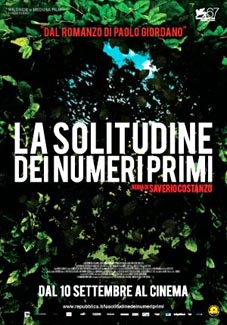
Starts August 11
Original language: Italian
 As a young boy, Mattia faithfully watched over his retarded twin sister Michela. Just once, he let down his guard in order to go to a birthday party, his chance to be like all other boys. He set his sister on a park bench and when he returned after the party, she had disappeared forever. Burdened by this guilt, he grows into a good-looking young man, reticent, almost autistic around other people, but also a genius in mathematics. Parallel is the story of Alice, whose parents think they are doing the right thing to encourage her to ski. A crippling ski accident absolves her of further participation, forever. As a handicapped person, she also exists on the edge of normal society. Alice and Mattia are each one of a kind – a “prime number” which stands on its own, with little relationship to the other “numbers.”
As a young boy, Mattia faithfully watched over his retarded twin sister Michela. Just once, he let down his guard in order to go to a birthday party, his chance to be like all other boys. He set his sister on a park bench and when he returned after the party, she had disappeared forever. Burdened by this guilt, he grows into a good-looking young man, reticent, almost autistic around other people, but also a genius in mathematics. Parallel is the story of Alice, whose parents think they are doing the right thing to encourage her to ski. A crippling ski accident absolves her of further participation, forever. As a handicapped person, she also exists on the edge of normal society. Alice and Mattia are each one of a kind – a “prime number” which stands on its own, with little relationship to the other “numbers.”
Based on the book of the same name by Paolo Giordano, director Saverio Costanzo, restructured the story to fit the screen. He and Giordano are both credited with the script. The three parts of the story are intertwined as flashbacks and require three sets of actors: Mattia and Alice as children, then as teenagers, and then, seven years later as young adults. Alba Rohrwacher, who played Alice, lost ten kilograms in order to show that time had passed, while Luca Marinelli, as Mattia, gained 15 kilograms for the same reason. While working on his doctorate in physics at age 26, Giordano successfully published the book in 2008 and immediately won Italy’s best book prize, called the Premio Strega. He admits that the story is partly autobiographical. After reading the book, immediately after watching the film, I was amazed that anyone could reproduce such a smooth, logical film, which grips the emotions. It is especially interesting to see new, relatively unknown Italian actors, as well as Isabella Rosselini in a cameo role as Mattia’s mother.
